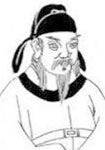“独占天门近紫宸”的意思及全诗出处和翻译赏析
“独占天门近紫宸”全诗
宝马竞随朝暮客,香车争碾古今尘。
烟光正入南山色,气势遥连北阙春。
莫见繁华只如此,暗中还换往来人。
作者简介(秦韬玉)

秦韬玉 唐代诗人,生卒年不详,字中明,一作仲明,京兆(今陕西西安市)人,或云郃阳(今陕西合阳)人。出生于尚武世家,父为左军军将。少有词藻,工歌吟,却累举不第,后谄附当时有权势的宦官田令孜,充当幕僚,官丞郎,判盐铁。黄巢起义军攻占长安后,韬玉从僖宗入蜀,中和二年(882)特赐进士及第,编入春榜。田令孜又擢其为工部侍郎、神策军判官。时人戏为“巧宦”,后不知所终。
《天街》秦韬玉 翻译、赏析和诗意
《天街》
九衢风景尽争新,
独占天门近紫宸。
宝马竞随朝暮客,
香车争碾古今尘。
烟光正入南山色,
气势遥连北阙春。
莫见繁华只如此,
暗中还换往来人。
中文译文:
九条大道景色都在争取变得更加壮丽新颖,
唯有天门一带靠近皇宫,
能独享的特权。
宝马车在早晚接送朝廷使者时争相跟随,
香车在辗过古今尘土时争相竞抢。
雾气正好透入南山的颜色之中,
气势恢宏远连北方皇宫的春天。
不要以为只有这些繁华景象,
在暗处还有着往来于这里的人们。
诗意和赏析:
这首诗以唐朝的壮观景象和人们的繁华生活为主题,描绘了街道上的繁华和车马的喧嚣。诗中所描述的天街是指位于长安城中央的皇宫周围的街道,那里是富贵人家、高官显贵们居住的地方,每天都有着车马接送朝廷使者和贵族们的繁忙场景。
全诗运用了对比的手法,将九条大街道景色新颖独特的一面与天门一带的繁华形成对照。诗人描述了车马穿梭于繁华街道上的景象,满街的豪车奢侈品与古老的行人尘土相遇,强调了现代都市繁忙生活和古代街道的历史渊源。
Verse translation:
"Tianjie" (Heavenly Street)
The nine streets compete to be new and novel scenery,
Only the streets near the imperial palace
Can enjoy exclusive privileges.
The luxury carriages compete to follow the morning and evening officials,
The magnificent carriages compete to crush the ancient and modern dust.
The mist light is just entering the colors of the southern mountains,
The momentum extends far to the northern imperial palace in spring.
Don't think that this is the only magnificence,
In the darkness, there are still people coming and going.
Interpretation and Appreciation:
This poem revolves around the magnificent scenes and prosperous lives of the Tang Dynasty, depicting the hustle and bustle of the streets and the noise of carriages and horses. The "Tianjie" in the poem refers to the streets surrounding the imperial palace in the center of Chang'an city. It is the place where wealthy families and high-ranking officials live, and there are scenes of bustling officials and nobles being escorted by carriages and horses every day.
The poem uses a contrasting technique, juxtaposing the novel and unique scenery of the nine streets with the prosperity of the streets near the imperial palace. The poet describes the scene of carriages and horses shuttling on the bustling streets, where luxury cars and extravagant goods meet the ancient pedestrians and their dusty surroundings, emphasizing the busy modern life and the historical origins of the ancient streets.
“独占天门近紫宸”全诗拼音读音对照参考
tiān jiē
天街
jiǔ qú fēng jǐng jǐn zhēng xīn, dú zhàn tiān mén jìn zǐ chén.
九衢风景尽争新,独占天门近紫宸。
bǎo mǎ jìng suí zhāo mù kè,
宝马竞随朝暮客,
xiāng chē zhēng niǎn gǔ jīn chén.
香车争碾古今尘。
yān guāng zhèng rù nán shān sè, qì shì yáo lián běi quē chūn.
烟光正入南山色,气势遥连北阙春。
mò jiàn fán huá zhī rú cǐ, àn zhōng hái huàn wǎng lái rén.
莫见繁华只如此,暗中还换往来人。
“独占天门近紫宸”平仄韵脚
平仄:平仄平平仄仄平
韵脚:(平韵) 上平十一真 * 平仄拼音来自网络,仅供参考;诗句韵脚有多个的时候,对比全诗即可判断。